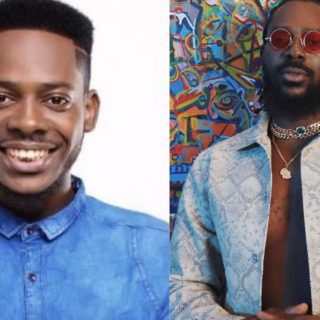What does it mean to be a man? Surely, it’s not one thing. It’s a series of little moments that add up. Man Like is a weekly Zikoko series documenting these moments to see how it adds up. It’s a series for men by men, talking about men’s issues. We try to understand what it means to “be a man” from the perspective of the subject of the week.
Today’s Man Like is Dr Idowu Afinowi, a psychiatrist. He tells us about growing up poor even though his dad was well-to-do, almost failing in school because he was juggling two degrees and how his profession helped him become more empathic.
What was growing up like?
I grew up in a Muslim family. My mum was the first wife, and she had six kids. When I was five, the marriage became strained and they separated. I couldn’t live with my dad because he was a customs officer who was deployed across the country.
What was growing up with your mum like?
It was tough sometimes. While my dad was a customs officer who earned well, my mum worked as a non-academic staff in a secondary school and earned a paltry salary.
Surviving was such a struggle sometimes. I remember one night my mum had no choice but to prepare efirin, which she plucked from a farm, to make some kind of soup. It tasted terrible, and I blurted out that it was bad and I couldn’t eat it.
For years, I regretted what I said.
How did growing up with your mum affect your relationship with your dad?
It didn’t. My dad and I were good friends, and we still are. I understood that we couldn’t live with him due to circumstances. He paid for our education; it was very important to him that all his children studied to the highest levels.
What was your friendship like?
We only got to see him once in a while, whenever our holidays and his work leaves aligned. He is a jovial man, so there were lots of running jokes between us. He’d laugh at my jokes and give me money.
The only disparity we had was our religion. Since I grew up with my mum, who is a devout Christian, I was Christian. He would have preferred us to be Muslim, but he’s also learned that being a Christian or Muslim doesn’t stop a bad person from being bad.
Tell me about becoming a psychiatrist.
I initially wanted to study medicine, but I couldn’t get the required score in JAMB, so I went to Yaba College of Technology (Yabatech) for an OND. I continued trying to study medicine, and in 2003, the final year of my programme, I finally got admission to study my dream course at Lagos State University (LASU). I had to shuttle between classes in Yabatech and LASU.
That must have been difficult.
It was. LASU came with its own problems. Competition to get into the College of Medicine (COM) in 200-level was tough. Out of 150 students in 100-level, only the top 50 were going to get into COM. Meanwhile, I was also trying to finish my OND at Yabatech. It was gruelling.
Because I was struggling, I got a C in a 100-level course which would have made me miss getting into the college of medicine. I thought I had missed my chance. I wanted the ground to swallow me up.
When the list was released, 51 people were chosen to proceed to the college of medicine and I was one of them.
So why did you choose psychiatry?
One day, we were waiting in class when a new lecturer walked in for our psychology class. He talked to us about psychoanalysis and claimed he could tell things about a person just by looking at them. The class murmured in disbelief. He asked for a volunteer, and my hand was the first to shoot up. He called me out, looked at me for a few seconds and said, “I can see that you’re jovial, brave and confident.” I was in awe of this and that was the moment I decided I was going to be a psychiatrist. His name is Prof. Coker.
What’s your job like?
I was very excited when I started my residency training in 2014, four years after becoming a medical doctor. My job makes me more empathic because I understand people and what makes them tick. I understand that Nigerians are experiencing a lot of trauma and need mental health assistance, so I understand when a danfo driver drives recklessly on the road. It also helps me raise my son in a mentally healthy environment.
My mentor, the late Prof. Bankole used to say, “If not for grace, you could have been the patient, and the patient could have been you. So treat them as you would have liked to be treated if that were you.” That’s my guiding principle in my professional life. I treat my patients with the utmost care, respect and dignity. Being mentally ill doesn’t make any person less human. Treating them well even helps them get better quicker. I wish people would understand that mental illness is just like any other illness in the body.
Recently, I talked to my mum about what I said about the efirin soup when I was young and apologised to her for not recognising that she was trying her best.
That’s great. What did she say?
She didn’t even remember the incident.
Tell me about having a son.
I got married in 2018, and we had our first son a year after. Fatherhood is interesting. It’s amazing to have a mini-you running around, and recognising your character traits in them. Fatherhood is also scary. I once had to carry out emergency manoeuvres on my son when he fell sick and stopped breathing in the middle of the night. Fatherhood also means being on your toes when it comes to providing. There’s a lot that goes into raising a child, especially financially. Once you have a family, you go from worrying about providing just for yourself to feeding several mouths that depend on you.
I’m also figuring out discipline. My wife thinks he listens to me better than he does to her. He’s an intelligent young man, and he’s already shown a knack for humour and mimicking people around him. I can’t wait to see the kind of man he becomes. Hopefully brave, confident and jovial, like this father. Haha!
Check back every Sunday by 12 pm for new stories in the Man Like series. If you’d like to be featured or you know anyone that would be perfect for this, kindly send an email.
Are you a man who would like to be interviewed for a Zikoko article? Fill this form and we’ll be in your inbox quicker than you can say “Man Dem.”




